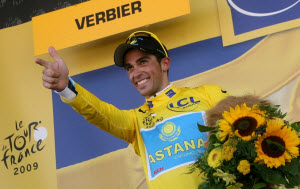 A doping inspector with the International Cycling Union (UCI) has backed the body’s claims that Lance Armstrong’s team were not given special treatment by UCI anti-doping inspectors at the 2009 Tour de France.
A doping inspector with the International Cycling Union (UCI) has backed the body’s claims that Lance Armstrong’s team were not given special treatment by UCI anti-doping inspectors at the 2009 Tour de France.
Doctors from France’s national anti-doping agency (AFLD) carried out most of the drug testing at July’s three-week epic, won by Armstrong’s Astana teammate Alberto Contador, under the watchful eye of UCI inspectors.
The AFLD has since alleged the UCI were slack in their approach to the operation, going as far as claiming that Astana were among the most “blatant” when it came to delays during doping controls.
However Britain’s Barry Broadbent, a UCI doping inspector, says the AFLD claims are wide of the mark.
He also believes Astana were among the most scrutinized teams on the race.
“If I were to make a report on the Tour de France, I would say they were the opposite,” said Broadbent when asked what he thought of a damning report by the AFLD which criticised the UCI’s anti-doping system at the race.
“The AFLD were subjecting them to more controls at more inconvenient times than anyone else.
“To say that one team had privileges when clearly they were tested more than any other team seems quite ridiculous to me.”
AFLD president Pierre Bordry said Wednesday he was “surprised” at the lack of positive doping tests during this year’s race.
He also charged: “What is surprising is that the UCI does not organise the controls in a regular manner, which can create opportunities (for teams or riders).”
However Broadbent played down the influence of the UCI inspectors at the three-week race. And he believes Bordry’s allegations stem from his body’s reluctance to collaborate with the UCI.
“We are only observers for the French doctors who do the samples, appointed by the AFLD.
“We identify the riders, we take charge of the situation, that is we make sure we’ve got the right people,” he added.
“But from then on the actual procedure of taking the urine sample is conducted by the doctors, in this case appointed by the AFLD and of course ratified by the UCI that they were suitable people.
“The only tests conducted without AFLD doctors were on rest days. Other than those rest days, all other tests conducted were by AFLD doctors.”
He added: “I don’t understand where the AFLD is coming from. Whether there’s some inherent problem with the UCI conducting tests in what is the territory of the AFLD, I don’t know.
“It would seem that the AFLD don’t want to work with us, they want to work against us and I would have thought that in the fight against doping it’s essential that all agencies work together.
“It must be some political thing.
“I can’t understand anyone criticising the work of two inspectors who seem to be accepted by the riders and teams in the race, despite that we had what was a very demanding job for us and the riders.”